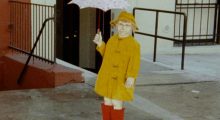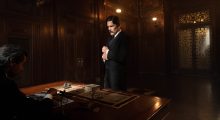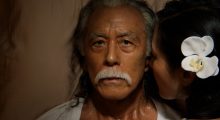Sundance
-
Sundance 2021 Critic’s Notebook 2 (Abby Sun): I Was a Simple Man, Strawberry Mansion, Cryptozoo

The Sundance Institute has been running producer and director labs since 1981, even before taking over and renaming the former US/Utah Film Festival in 1985. In that sense, the projects coming out of the Feature Film Program (whose founding director, Michelle Satter, is still in charge), Indigenous Program and Documentary Film Program are just as important a marker of Sundance’s effect on the US film ecosystem as the platform provided by the festival. When I programmed film festivals, I tracked their press releases as closely as official lineup announcements. This year, 16 projects in the festival were officially supported by […]
by Abby Sun on Jan 31, 2021 -
“The Colors and Textures of Being a Teenage Girl”: Director/Cinematographers Parker Hill and Isabel Bethencourt on Cusp

-
“I Think I was Just Hip to Loneliness Before Everyone Else Was”: Writer/Director Jane Schoenbrun and Composer Alex G on the Sundance-Premiering We’re All Going to the World’s Fair


She’s turning into plastic. He feels like his body is being taken over by an indescribable entity. Another discovers grotesque clusters of gray pustules suddenly colonizing the terrain of their body. These individuals are documenting themselves in the throes of The World’s Fair Challenge, an online role-playing game that dares those bold enough to participate to draw blood, watch a neon-soaked strobing video and record the ensuing horror that eventually consumes their corporeal vessels. Casey (played by Anna Cobb in her debut role), a nondescript yet quietly rebellious teenager living in a perfectly captured amalgamation of American suburbia, becomes the […]
by Natalia Keogan on Jan 31, 2021 -
Sundance 2021 Critic’s Notebook 3 (Vadim Rizov): El Planeta, Luzzu, Taming the Garden


I generally strive to be a well-informed viewer; in the case of Amalia Ulman’s El Planeta, however, I was perhaps better served by going in uncharacteristically ignorant. I didn’t really know anything about Ulman besides the fact that she’s a performance/video/web-artist, so I wasn’t picking up on any of her debut feature’s connections to the personas developed on Instagram, galleries et al.. Instead, Ulman’s debut feature, shot in the town of Gijón, where she grew up, registered as exactly the type of movie I like, a droll comedy formally descended from Éric Rohmer. Rohmer’s legacy doesn’t just lie in delicately shaded […]
by Vadim Rizov on Jan 31, 2021 -
“These Girls Say So Much with their Faces”: Director/Editor Parker Hill on Cusp




Parker Hill and Isabel Bettencourt’s Cusp embeds itself with a trio of teenage girls, all sustaining best friends, over the course of a long, alcohol-sodden rural Texas summer. Relationships come and go, but cycles of systemic sexual abuse and misogyny structure the lives of its indefatigable protagonists. Hill, who also served as Cusp’s editor, discusses the project’s winnowing down, working with a consulting editor and learning to let go of footage. Filmmaker: How and why did you wind up being the editor of your film? What were the factors and attributes that led to your being hired for this job? Hill: Impatience, stubbornness, and […]
by Filmmaker Staff on Jan 31, 2021 -
“The Pandemic Meant There was Nothing to Do All Summer Except Sit at Home and Edit”: Directors Parker Hill & Isabel Bethancourt | Cusp




How did events of 2020—any of them—change your film, either in the way you approached it, produced it, post-produced it, or are now thinking about it? Making our first feature in 2020 was definitely a rollercoaster. In some ways the pandemic meant there was nothing to do all summer except sit at home and edit, which was a very intense process, but it was helpful to fully immerse ourselves in the footage day in and day out. We were definitely fortunate to have something to focus on at home. In post production, it was certainly challenging to work with so […]
by Filmmaker Staff on Jan 31, 2021 -
Sundance 2021 Critic’s Notebook 2 (Vadim Rizov): The Sparks Brothers, Mother Schmuckers


Now entering their sixth decade of steady musical production, Sparks—brothers Ron and Russell Mael’s remarkably enduring musical project—has proved equally alienating to multiple generations of American listeners no matter what phase they were in. During the very first days of MTV, clips for their Moroder-produced “No. 1 Song in Heaven” and “Try-Outs for the Human Race” were in regular rotation (if only because there was so little else to show). But when not involuntarily exposed to them, American audiences rejected Sparks whether in their glam, disco, ’90s synth or 2002-and-onwards minimalist keyboard-loops periods—especially true of the latter, their longest-lasting mode to […]
by Vadim Rizov on Jan 30, 2021 -
“Cardboard Cutouts Don’t Grow Old, They Don’t Die”: Jan Oxenberg on Criterion’s Rerelease of Her “Docu-fantasy” Thank You and Good Night


Jan Oxenberg was a thorn in the nonfiction establishment’s side long before hybrid doc-making was a thing (or even a term). Case in point: Her feature-length (Sundance ’91) debut Thank You and Good Night, a restoration of which will hit the Criterion Channel this week (along with two of the queer pioneer’s earlier shorts, 1973’s Home Movie and 1975’s A Comedy in Six Unnatural Acts, accompanied by a new director’s intro). Though Thank You and Good Night has been described as a “docu-fantasy” it’s also a very real time capsule of sorts. The film takes as its starting point the looming […]
by Lauren Wissot on Sep 24, 2020 -
Sundance 2020 Final Dispatch: Softie, Farewell Amor, A Machine for Viewing, Infinitely Yours


Previously, when attending a premiere heavy festival like Sundance, I was usually lucky enough to be present as part of a team of programmers. We divided the screenings between all of us to cover as many of the films as possible. (There are spreadsheets and rating systems involved.) Watching films as a freelancer, I realized over the first few days at Sundance that I was playing it safe by watching films by filmmakers I was already familiar with for the guarantee that at least the film would appear finished at the screening. For programmers working at festivals like Sundance, what […]
by Abby Sun on Feb 19, 2020 -
Sundance 2020 Dispatch 9: Dick Johnson is Dead, Tesla


I don’t have anything like Six Takeaways From This Year’s Sundance to structure my final dispatch: The most I can offer is my general peer group’s consensus that the fiction side was relatively quiet while nonfiction work was stronger and more attention-getting, including the four-film launch of Concordia Studio. They arrived with, among others, my personal best-of-fest Bloody Nose, Empty Pockets and Time, and ended their first Sundance with the (reported) $12 million sale of verité doc Boys State to Apple and A24. Also high on the nonfiction priorities list, via Netflix, was Kirsten Johnson’s Dick Johnson is Dead, which premiered with the director […]
by Vadim Rizov on Feb 4, 2020

